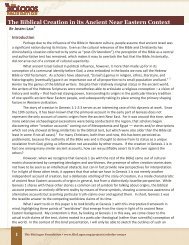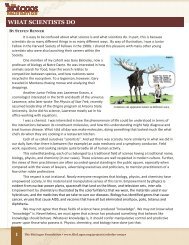Miracles and Science: The Long Shadow of David Hume - BioLogos
Miracles and Science: The Long Shadow of David Hume - BioLogos
Miracles and Science: The Long Shadow of David Hume - BioLogos
You also want an ePaper? Increase the reach of your titles
YUMPU automatically turns print PDFs into web optimized ePapers that Google loves.
<strong>The</strong> <strong>BioLogos</strong> Foundation • www.<strong>BioLogos</strong>.org/projects/scholar-essays<br />
Perhaps because evolution has been a particularly favorite bludgeon <strong>of</strong> the science = atheism cabal, a<br />
Christian mini-industry has sprung up to debunk it. Unfortunately, this only feeds the public misperception<br />
that the core <strong>of</strong> the conflict between science <strong>and</strong> faith concerns scientific mechanism (evolution did or did<br />
not occur) rather than one <strong>of</strong> the philosophy <strong>and</strong> interpretation <strong>of</strong> science. God could, <strong>of</strong> course, have<br />
regularly used miracles to create throughout the time-span <strong>of</strong> natural history. He is free. But whether he<br />
did so in natural history is fundamentally a question <strong>of</strong> Biblical interpretation. 32 Surely it is even more<br />
glorious if God could design a physical system that creates itself through the regularities <strong>of</strong> his sustaining<br />
action. Like many <strong>of</strong> my Christian scientific colleagues who hold to a high view <strong>of</strong> Scripture, I believe the<br />
biblical text allows itself to be interpreted in this way, that sentient beings arose primarily through the<br />
ordinary “customs <strong>of</strong> the Creator,” <strong>and</strong> that moreover it glorifies God to seek to underst<strong>and</strong> these<br />
patterns. 33<br />
John <strong>and</strong> Ruth might then ask: if I emphasize the integrity <strong>of</strong> the regular action <strong>of</strong> God in sustaining the<br />
universe, <strong>and</strong> even in creating us, then why should miracles occur at all Can they occur today Rather<br />
than answer that theological question directly, let me resort to a musical analogy borrowed from Colin<br />
Humphreys. Suppose you are watching a pianist play a classical piece. You will notice that there are<br />
certain notes that he plays, <strong>and</strong> certain ones that he never does. <strong>The</strong> choice <strong>of</strong> notes is constrained<br />
because the music is being played in a particular key signature. But then, occasionally he may break this<br />
rule <strong>and</strong> play an unusual note. Musicians call these accidentals, <strong>and</strong> a composer can put them in wherever<br />
she likes (although if there are too many the music would sound strange). As Humphreys puts it,<br />
If he is a great composer, the accidentals will never be used capriciously: they will always make<br />
better music. It is the accidentals which contribute to making the piece <strong>of</strong> music great. <strong>The</strong> analogy<br />
with how God operates is clear: God created <strong>and</strong> upholds the universe but, like the great composer,<br />
he is free to override his own rules. However, if he is a consistent God, it must make more sense than<br />
less for him to override his rules. 34<br />
11<br />
<strong>Miracles</strong> <strong>and</strong> <strong>Science</strong>:<br />
<strong>The</strong> <strong>Long</strong> <strong>Shadow</strong> <strong>of</strong> <strong>David</strong> <strong>Hume</strong><br />
BY ARD LOUIS




